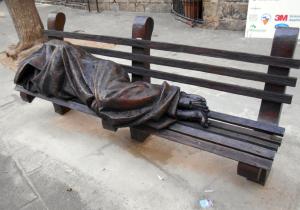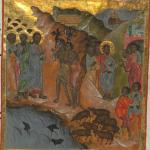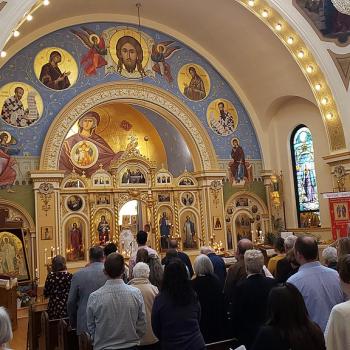
Bede, in his homilies, reminds us of a few ways we can encounter the presence of Jesus in our lives:
By the frequent occurrence of his bodily manifestations our Lord wished to show, as I have said, that he is present by his divinity in every place to the desires of those who are good. He appeared at the tomb to those who were grieving; he will also be present to us when we are salutarily saddened at recalling his absence. He came to meet those who were retuning from the tomb so that, having learned of the joy of his resurrection, they might proclaim it; he will also be present to us when we rejoice in faithfully announcing the good things that we know to our neighbors. He appeared in the breaking of the bread to those who, supposing that he was a stranger, invited him to share their table; he will also be present to us when we willingly bestow whatever goods we can on strangers and poor people; and he will be present to us in the breaking of bread, when we partake with a chaste and simple conscience of the sacrament of his body, namely, the living bread.[1]
First, Bede tells us that, as he is God, Jesus is everywhere present: that he is present by his divinity in every place to the desires of those who are good. God’s presence is everywhere; he is omnipresent. Because He is God, fully God, this means the presence of Jesus is found everywhere, although our ability to apprehend that presence is often hindered many factors, but most of all by our sins, for they influence us and how we perceive and experience reality. God can, and does, work with us to help us overcome the veil which our sins places between him and us. With his aid, we can fight against sin and eliminate it in our lives. Through the elimination of sin, we become good, because sin corrupts the goodness which we otherwise would have. Those who are good will naturally desire what is good. They will desire to keep what is good, and that means, they will embrace the source of their goodness so that they can continue to be good. This is why those who are good will naturally act for and desire God, because he is the source and foundation of every good (cf. Jas. 1:17).
Second, Bede tells us, he will also be present to us when we are salutarily saddened at recalling his absence. This presence comes in two forms. The first is the reality of his presence, that he is already there, indeed, he is always there with us, but we fail to perceive him, because of all the different potential factors that can get in the way of our perception of God. But he is also present in his absence in the sense that we will call him to mind, we will remember him. In our remembrance of him, we imagine him and connect with him through the image which we make of him within our minds. That is, as he is present with us in his image, he is present with the image we make of him in our remembrance of him. It is to be sure, a particular, indeed, limited, kind of presence, but it is enough to help us draw in closer to him. This remembrance of Jesus in his image must not be understood as being the same presence as found in his eucharistic presence. The eucharistic presence is a special, sacramental representation of him which uses that imagined presence and impresses it upon matter so as to provide for us a way to encounter him, not just in our mind, but in and through matter as well.
Third, we encounter Jesus as we relate to and share with others all the good which he has done, especially all the good which he has done in and for us: he will also be present to us when we rejoice in faithfully announcing the good things that we know to our neighbors. This is the presence found in the proclamation of the Gospel, the presence of the Word in our word, with the highest, greatest representation of this presence being Scripture itself (which is why some theologians have bene known to talk about Scripture as being a body of Christ, because they recognize the presence of Christ in Scripture). Insofar as we properly proclaim him, we present him to others, and in that presentation, those who listen to us and are open to what we have to say are capable of receiving his presence in their lives, and with it, the grace which he is willing to grant to all who are willing to accept it.
Fourth, Bede tell us Jesus will be present to us when we willingly bestow whatever goods we can on strangers and poor people. This follows from the words of Jesus, for he told us that what we do for others in need of our help, we do for him: “Truly, I say to you, as you did it to one of the least of these my brethren, you did it to me” (Matt. 25:40b RSV).[2] We do it for him because his image is in those people. True, as we are all created in the image and likeness of God, his image is in all of us, but he chose to become one with the poor and dispossessed for our own sake, and so the poor and dispossessed represent him and his kenotic glory more than those who are rich and powerful, for wealth and power covers up that image (cf. 2 Cor. 8:9). Thus, just as we know that images are permissible because the Son is the express image of the Father, we also know images representing the Son, Jesus, through the poor and abused is permissible because Jesus himself has already used them to represent himself.
Fifth, there is, of course, the eucharistic presence, which is found in the breaking of bread, when we partake with a chaste and simple conscience of the sacrament of his body, namely, the living bread. In this form, we partake of Jesus, opening ourselves us up to him, as we eat and drink the bread and wine which is really his body and blood. We are to eat and drink worthily, for Jesus comes within us with the winnowing fan, putting to fire all that is sin, separating the wheat from the chaff. If we take the sacramental presence unworthily, if we take it out of pride, if we partake of the communion bread and wine while rejecting the demands of love, we risk him coming to us with that winnowing fan, cutting us up and throwing all that is connected to such unlove to the fire.[3] Thus, with communion, Jesus refines us, and the more refined we become, the more united we become, not only with him, but all others who have opened themselves up to him as well. This is how we are made one in the eucharist.
What Bede did not relate, at least specifically, is the presence of Jesus found in the images which we make of him, but he did not need to do so, because they are already implied in the way Jesus is present in our proclamation of him. Our images serve as way for us to present him to others, for in and through them, we get a sense of his person and is personality which is often incapable of being established by words alone (this is why a picture is not just worth a thousand words, but more than that, for there is much which we experience and realize through pictures which we cannot put to words).
There are many ways in which we can and should experience the presence of Jesus. However, if we are closed off to him, if we want to ignore him, seeing no good, hearing no good, indeed, doing no good, his presence will still be there, but we will not be able to see or hear or experience him in any conscious fashion. Nonetheless, because that presence will be there, that the potential for grace will remain. Through us universal presence, we find there will always be hope, hope that we will turn around and seek the good, and in seeking the good, we will eventually overturn the obstructions which we have put in place between him. Then we will then be able to encounter him in the various ways he will make himself present to those who love him.
[1] Bede the Venerable, Homilies on the Gospels. Book Two: Lent to the Dedication of the Church. Trans Lawrence T. Martin and David Hurst OSB (Kalamazoo, MI: Cistercian Publications, 1991), 75 [Hom. II. 8].
[2] Some might object and state that this was only a parable, but it was a parable he said concerning the eschatological judgment, a judgment which has Jesus as the judge. The parable presents to us the way Jesus himself will act as a judge in the last judgment.
[3] If we have cast out from ourselves all that is good and true, all that is tied to love, what will there be left of us after Jesus has thrown all that is sin into the fire?
Stay in touch! Like A Little Bit of Nothing on Facebook.
If you liked what you read, please consider sharing it with your friends and family!













